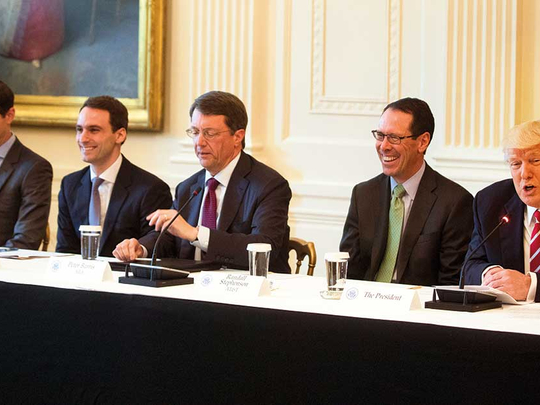
Washington
At the US Department of Justice, staff members in the antitrust office have been doggedly investigating AT&T’s blockbuster $85.4 billion bid for Time Warner.
They have deposed the executives of both companies; questioned several media, telecommunications and technology rivals; and demanded thousands of pages of confidential documents from scores of businesses to discern if the deal would violate competition laws — and thus if it should go ahead at all.
But eight months into the review, the small army of career antitrust officials is marching toward a great unknown.
For one thing, the Justice Department officials still don’t have a boss who will have the final say on whether to approve or block the deal. President Donald Trump’s pick for assistant attorney-general in charge of antitrust matters, Makan Delrahim, has been held up in a logjam of nominees in the Senate.
And Trump himself is another wild card. A senior administration official said that members of the White House were discussing how they might use their perch over the merger review as leverage over Time Warner’s news network, CNN.
All of that has effectively put into limbo the most significant business deal before the Trump administration, a benchmark for business transactions going forward. In turn, that has cast a cloud over the business world, which is watching the lengthy regulatory process with intense interest.
“We’ll obviously take a hard look at that,” Charles W. Ergen, the chief executive of Dish Network, said. “It’s going to be a big deal. We’re certainly going to have some concerns.”
Ergen said that AT&T’s purchase of Time Warner would spur other cable and satellite companies to seek deals with wireless companies and content firms. “People on the sidelines have to do something different,” he said. “You can remain on the sidelines, but that might be malpractice.”
The deal is still expected to be approved because AT&T and Time Warner don’t directly compete. But unlike past mega-mergers such as Comcast’s purchase of NBCUniversal in 2013, this one is potentially trickier from an antitrust perspective. That’s because AT&T has a nationwide footprint with its wireless and DirecTV satellite service, and could use that reach to demand higher fees from media companies and other cable and satellite firms.
While the AT&T and Time Warner regulatory review is not taking longer than those of other mega-deals, the delay in bringing in a permanent assistant attorney-general has put the process into a holding pattern. And in the vacuum of leadership, more obstacles have emerged for the deal.
Some employees of media and telecom companies were recently deposed as a part of an investigation by a coalition of about 20 state attorneys-general into AT&T’s purchase of Time Warner.
The attorneys-general asked whether AT&T would charge competitors like Dish higher fees for Time Warner content such as HBO shows and NBA basketball games on TNT, and whether such price increases could lead to higher television costs for customers who rely on satellite services.
Justice Department officials and the state attorneys-general are also exploring whether other content companies such as Starz, Cinemax and Showtime — premium channels offered at an extra cost like Time Warner’s HBO — could have a harder time reaching AT&T customers. Those companies are concerned that AT&T could promote only HBO to customers, they said.
AT&T could also offer free and unlimited viewing of HBO for its wireless customers while the streaming of competing premium channels would count against monthly data limits.
AT&T has said it still expects the merger review to be completed by the end of the year. Last month, AT&T’s chief executive, Randall Stephenson, attended a White House tech event, the latest of several meetings he has had with other executives and White House officials since the election.
Since the Time Warner bid was announced, AT&T has spent $8.2 million on lobbying. It had 27 outside lobbying firms and was ranked eighth in total lobbying spending.
AT&T has said that it has no incentive to withhold Time Warner shows from competitors and that the review appears to be moving smoothly. “Over the past eight months, we have provided information to any regulator that has requested it, and we have appreciated the chance to answer their questions,” said Fletcher Cook, a spokesman for AT&T.
Rival companies may push for the Justice Department to demand tough conditions for merger approval — but not to reject the deal outright. Inspiring government regulators to crack down on an acquisition would endanger their own consolidation efforts.
Even so, the uncertainty is set to continue.
New York Times News Service











